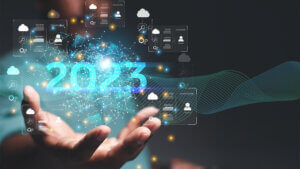There’s no denying that self-service devices are taking over. Whether at the bank, the doctors or the supermarket, you will usually have the option to use technology rather than speak to a real person. A UK survey revealed that 66% of people think self-service increases efficiency when shopping, with two-thirds of people calling for more self-service tills.
When it comes to overall preferences, a 2022 survey on LinkedIn highlighted a very close split between those who prefer manned tills in supermarkets and those who would rather use a self-service checkout, with 52% voting to use technology. It seems there are mixed opinions about the experience of using self-service devices.
In this article, the touchscreen specialists at Zytronic explore the positive and negative elements of such technological advances, concluding whether self-service devices are beneficial for those who are neurodivergent, people who are time-poor and more.
Key findings
- Staff satisfaction. A survey found 47% of consumers will always search for the answer to their question online before calling a company. Self-service devices empower the customer to find their own answers.
- Mental health and accessibility. A PwC survey found that 78% of UK consumers wanted to interact with a real person more as technology improved. New innovations can increase consumer engagement with a faster check in process and interactivity. They can also provide alternative options for those who are neurodivergent.
- Privacy. Privacy filters, such as those supplied by Zytronic, can allay fears when sensitive information needs to be input.
- Durability and outdoor use. PwC found that 32% of all customers would stop doing business with a brand after a single negative experience. Damage to devices through bad weather and low durability can have an impact on the customer base. But the right technology can aid consumer satisfaction, ultimately increasing revenue.
- Installing self-service devices can increase efficiency, customer satisfaction and staff job satisfaction. Although there are concerns surrounding mental health impacts and privacy, the option for human interaction alongside this technology can minimise the problem.
Staff satisfaction
One potential negative of the rise in self-service stations being installed is that there are fewer service roles – such as receptionists, retail assistants and customer care – available. This can lead to higher unemployment rates and a sense of discontent among staff.
However, technology does not have to replace staff. Instead, it should be utilised to make their lives easier and provide a more efficient experience for customers. A survey found 47% of consumers will always search for the answer to their question online before calling a company.
If over 50% of your customer base is prepared to use technology and find answers before contacting a company, it’s clearly beneficial for a business to put self-service options in place, thereby empowering customers. Installing self-service devices in places such as supermarkets and train stations means that staff no longer need to perform tasks that customers can complete themselves.
This can positively impact the customer’s experience, as they are empowered to complete transactions and find answers to common questions themselves. Staff, meanwhile, are free to help with more in-depth queries. This allows for a more personal experience when the customer needs further guidance, which in turn can increase job satisfaction for staff who feel they have made a real difference for their customers.
For instance, a self-service option at train stations enables customers to complete their payments and receive their tickets quickly and easily, freeing up staff to deal with more complex passenger requirements.
Mental health implications and accessibility
There are potential mental health implications to self-service devices becoming so commonplace. Technology might be efficient, but it limits human interaction and conversation. A PwC survey found that 78% of UK consumers actually wanted to interact with a real person more as technology improved. This survey was conducted before the COVID-19 lockdowns, which only exaggerated feelings of loneliness across Britain – 3.7 million adults reported experiencing feelings of loneliness by February 2021.
Certain groups within society are more at risk of these issues, such as older people or those belonging to ethnic minority communities. Those who are neurodivergent may also struggle with the rise in self-service technology – dyslexic people may find it easier to speak to a staff member rather than having to select from written options on a screen.
A positive point to take note of is that this technology can make some services more accessible. For instance, within the travel sector, a self-service check-in or ordering system at hotels and restaurants can allay fears about not being able to speak the language or understand a request. Both customers and staff can easily subvert language barriers with the addition of a ‘select language’ button on interactive room service and menu screens.
New innovations can also add a layer of fun interactivity to the customer experience, such as programmable table displays that allow guests to play games, communicate with their waiter or even order drinks for friends at another table! This takes pressure away from staff and means they aren’t constantly monitoring the room for guests in need of service.
Whilst some members of the neurodivergent community may find it beneficial to make requests via technology, rather than interacting with a person directly. For instance, those who experience hypersensitivity might appreciate being able to check in to a service or venue via a touchscreen system over waiting in a long, loud queue or busy service area.
Privacy
Privacy is also a concern with self-service devices, particularly in settings such as banks, where sensitive or personal information may need to be inputted. The proximity of bystanders can be off-putting without the reassurance of a staff member or the ability to discuss issues in a separate room.
Privacy filters can be installed in self-service devices to allay consumer fears, preventing displayed information from being viewed from certain angles. The viewing angle can be aligned to ensure only the person using the device can easily see the information.
Durability and outdoor use
The durability of such technology can be a concern, particularly with devices that need to be installed outside and run the risk of facing bad weather. Damaged and inefficient technology is not only difficult for the customer to use but may also incur extra cost to the business. For example, devices that have incurred weather damage once will need to be repaired, may need new costly components and may be weakened, needing more frequent repairs in the future.
Potential downtime also has to be considered, with customer frustration increasing when the technology does not work as expected. PwC found that 32% of all customers would stop doing business with a brand after a single negative experience. This percentage of consumers refusing to buy from a brand again would be very damaging to both reputation and profitability. This is particularly true for businesses with point-of-sale screens. Any downtime will directly impact useability and sales, resulting in a low return on investment.
However, with the right technology, durability doesn’t need to be an issue. Brands whose interactive screens and touchpoints work even under difficult weather conditions will stand out amongst the competition. For instance, interactive outdoor maps that can still be accessed when the user is wearing gloves and are made with anti-reflective glass to reduce reflections even indirect sunlight will provide the customer with a much more efficient and enjoyable experience.
Mark Cambridge, CEO at Zytronic, comments: “Self-service is an important aspect for businesses to consider. It can save time and money as well as increasing efficiency, customer and staff satisfaction. Although concerns surrounding mental health impacts and privacy remain, it is clear that the option for human interaction alongside this technology can minimise the issue and create a balanced experience for the customer.”








